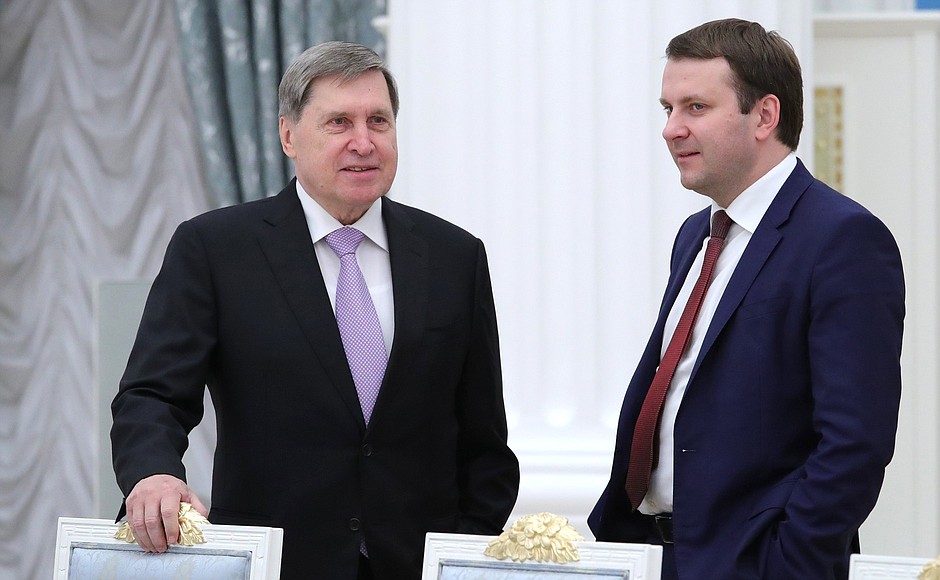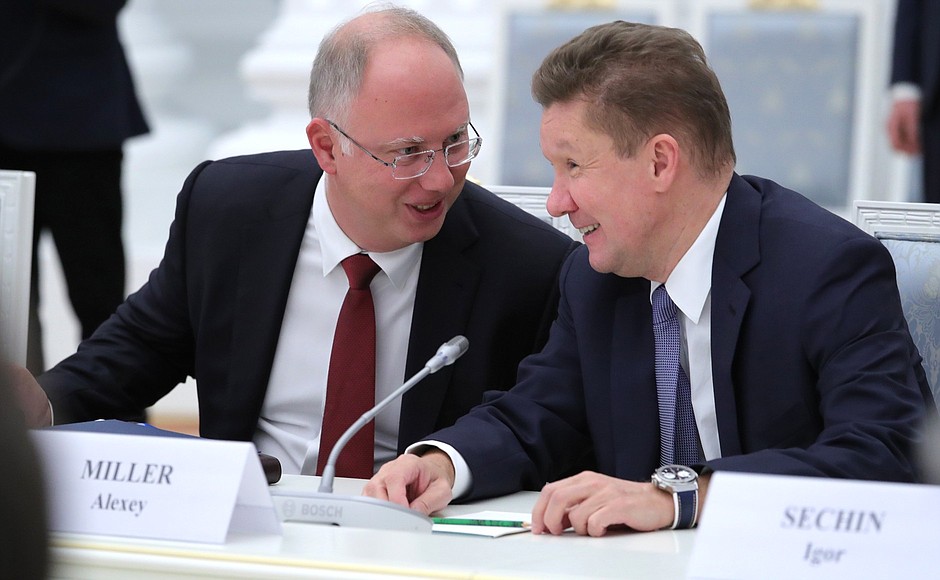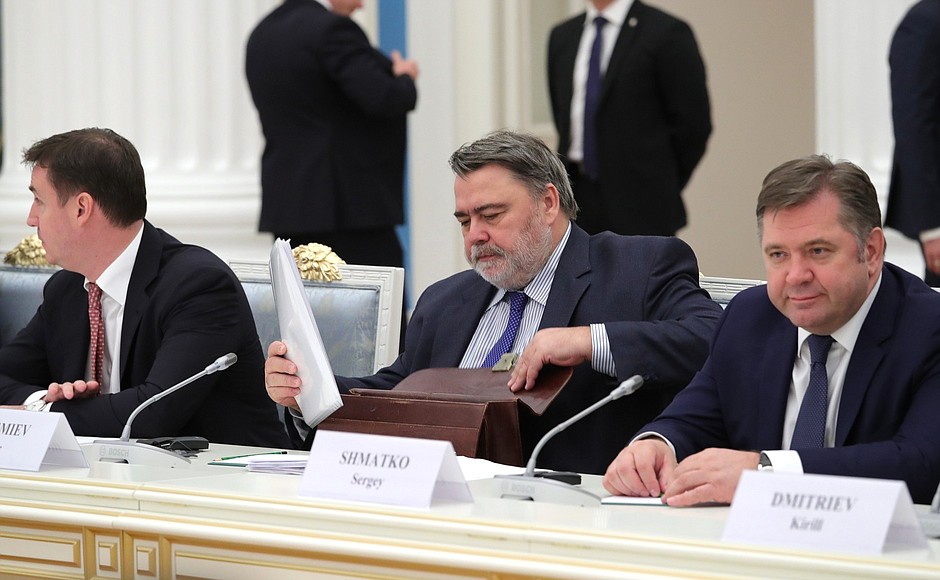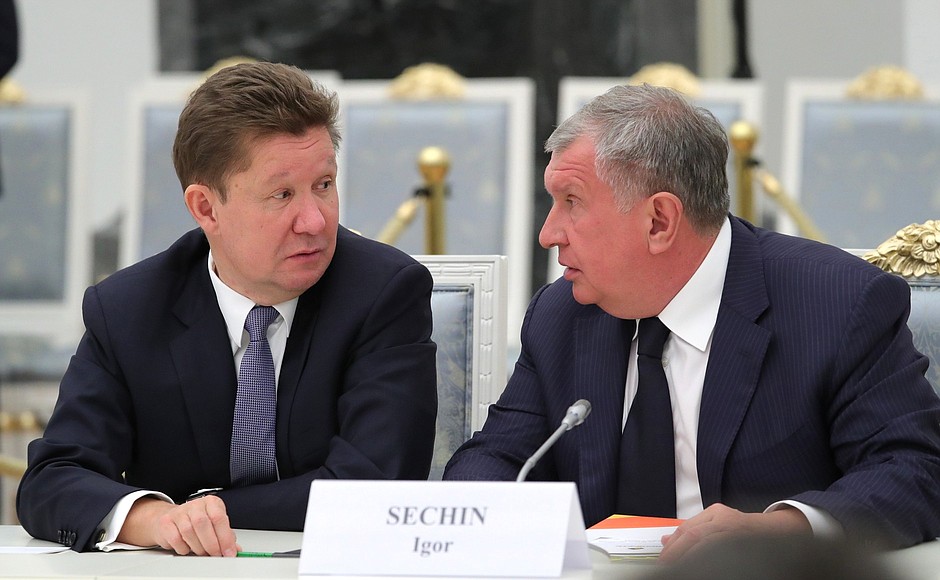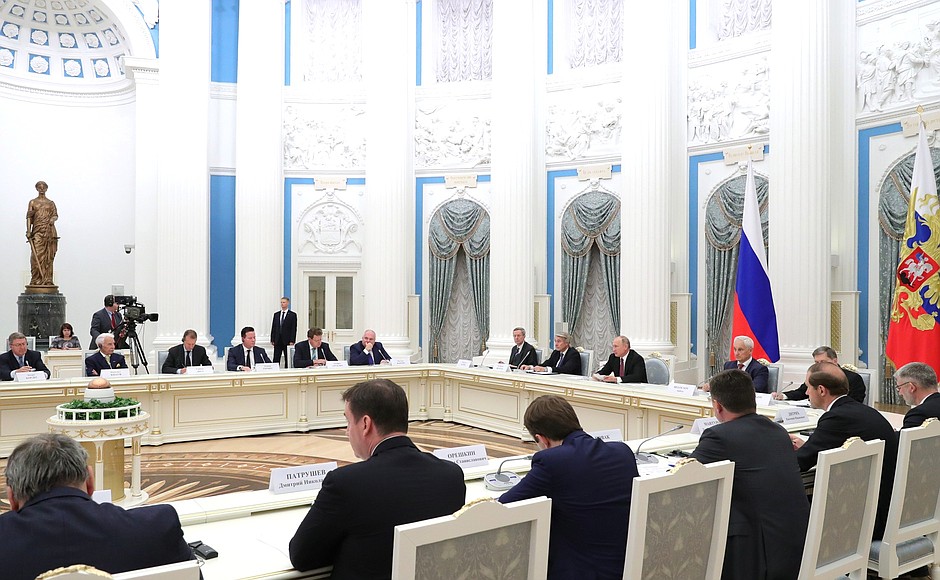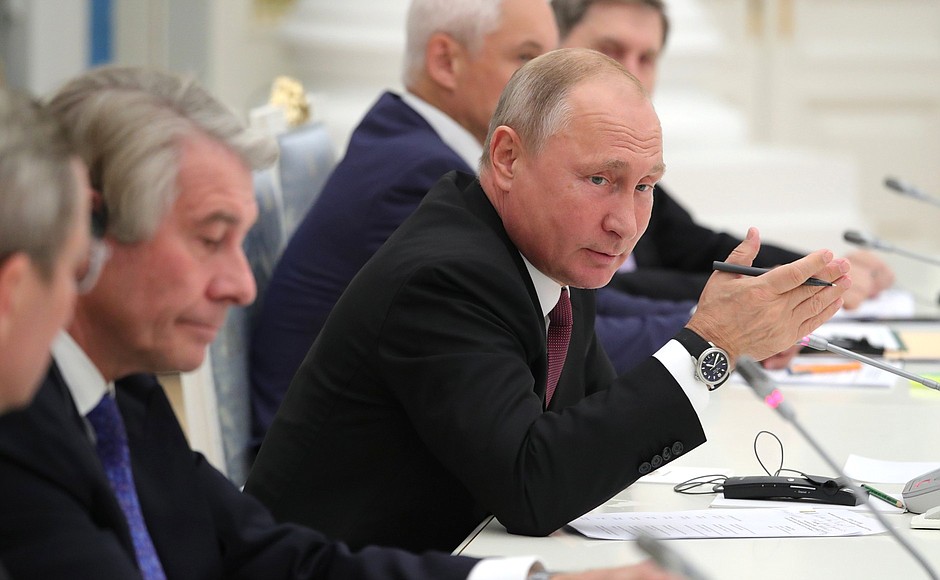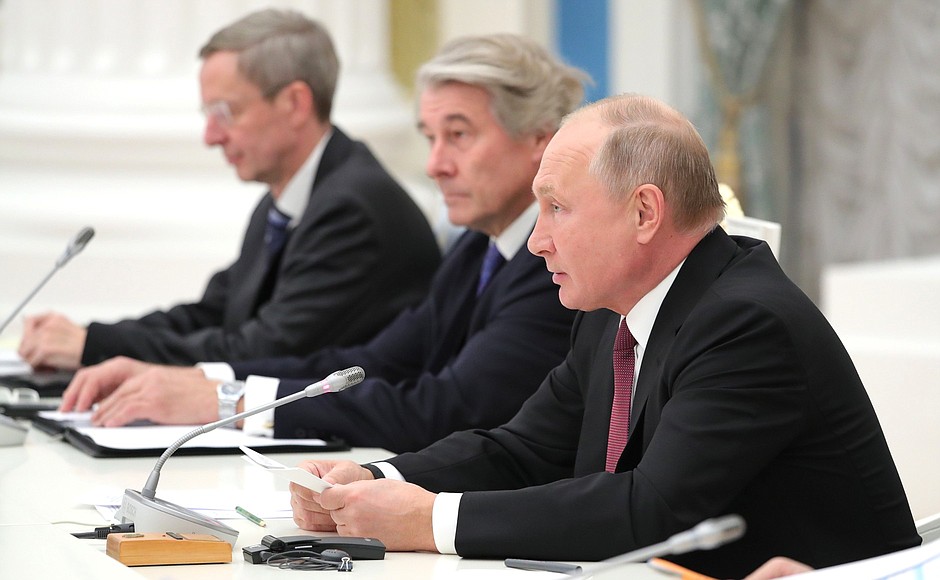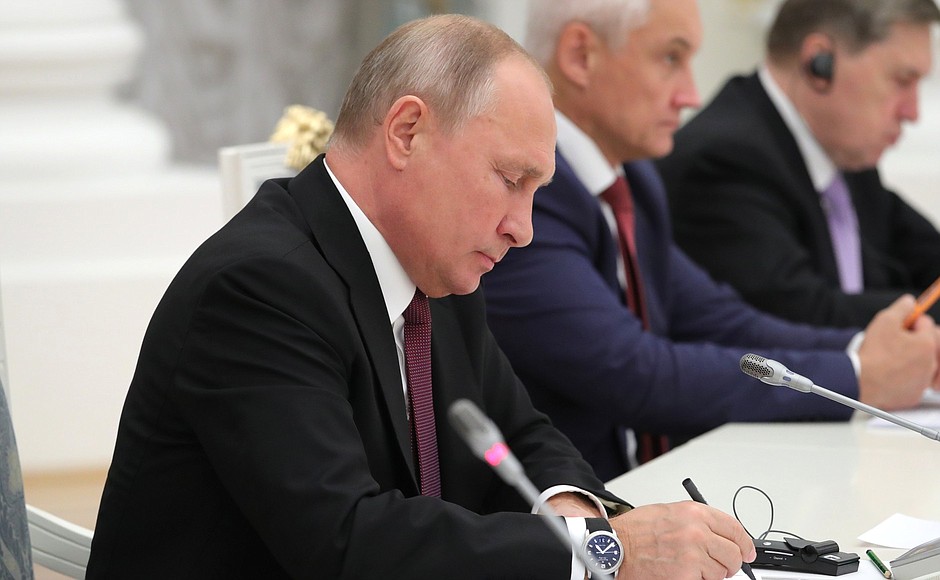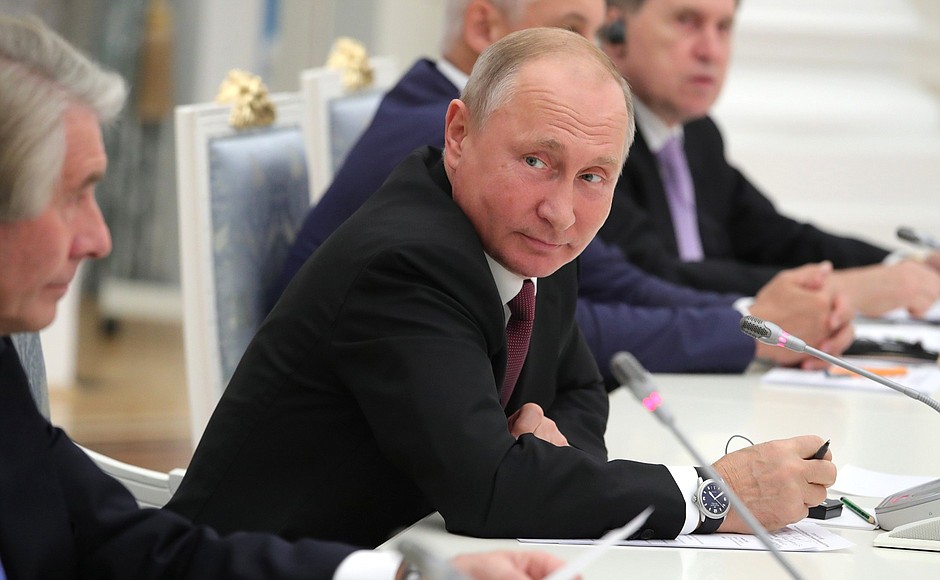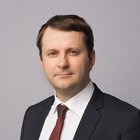The meeting participants discussed the current state of and development prospects for Russian-German trade and economic relations, the implementation of joint projects, including in energy, industrial cooperation, the digital economy and agriculture.
* * *
President of Russia Vladimir Putin: Good afternoon, colleagues,
I am very pleased to welcome members of the German Eastern Business Association, leading German entrepreneurs and our colleagues and friends.
This is the third meeting held in this format. I hope that today’s meeting will also prove useful, and we will have a sincere and business-like discussion of the current issues related to Russian-German trade and investment cooperation and prospects for further development.
Our regular direct contacts have practical importance, above all because Germany is one of Russia’s largest economic partners; the second largest after the People’s Republic of China.
Bilateral trade grew 23 percent to $50 billion in 2017, increasing another 24 percent in January-August. German investment in various sectors of our economy now exceeds $20 billion. Accordingly, Russia’s investment in the German economy is $9 billion as of today.
There are about 5,000 companies with German capital in Russia with about $50 billion in total revenue. Industrial sites are being built and modernised as a collaborative effort. Autos, agricultural equipment, trains, electrical equipment, and other high-tech products are being manufactured with the latest German technology.
For decades, our countries have been effectively cooperating in the energy sector. Russia’s supplies to Germany cover about a third of Germany’s natural gas and oil needs. Many landmark projects, such as the legendary Gas for Pipes and Nord Stream projects, have made a significant contribution to ensuring energy security not only of the Federal Republic of Germany, but all of Europe. The construction of the Nord Stream-2 pipeline system is well underway.
We highly appreciate German business’ commitment to cooperation, your pragmatism and constructive attitude, and hope that business ties between our countries will continue to expand progressively even amid the current difficult political and economic international situation.
We are convinced that investment and trade not only bring tangible profits to all the participants in this process, but also securely improve relations between our states. Based on the opinion of the business community, work continues in Russia to improve the legislative framework and law enforcement practices.
We will remove unnecessary administrative barriers and invest heavily in the infrastructure; in a word, we will do our best to make sure that foreign investors, including German investors, feel comfortable in our country.
Foreign entrepreneurs can receive assistance from the Russian Direct Investment Fund and have access to much government support provided they localise production in Russia, which, frankly, is not practiced much around the world.
Practical assistance in exporting Russian-made products is provided by the Russian Export Centre. Special economic zones and priority development area have been created in many Russian regions. Investors receive benefits that allow them to drastically, by up to 30 percent, reduce their capital costs.
Notably, the Russian economy is on the rise. In January-September, industrial output increased 3 percent, including the manufacturing industry, up 3.3 percent. The output of agricultural products increased by more than 20 percent over the past five years. Russian exports of food and agricultural raw materials increased 21 percent last year, exceeding $20 billion, further growing by another third in January-July.
Our agricultural exports have outpaced military equipment exports in terms of money. Our military-industrial complex exports stand at $15 billion, whereas agricultural exports, as I mentioned, totalled $20 billion. Our country is the largest supplier of wheat to the world market.
Unemployment remains at a record low of 4.5 percent. Indeed, inflation is slightly up from 2.5 percent in 2017 at 3.5 percent this year. The financial market remains stable. We have a trade surplus of $180 billion and a positive current account value of $100 billion.
Please note that the current account value is somewhat lower, by $80 billion, because it includes services and various kinds of payments, including dividends, some of which you received.
This means that our foreign investors, our friends and colleagues work in an open market, without restrictions on the movement of funds and capital, which, in my opinion, creates very good, favourable environment for the further development of business activities in Russia.
The relatively low external debt, the Central Bank’s growing reserves, its foreign reserves and the Government’s reserves are creating a very stable macroeconomic situation. Investment in core assets of enterprises and organisations has increased by 3.2 percent, freight turnover has gone up by three percent and retail trade by almost three percent, or to be precise by 2.7 percent, which points to the growth of domestic demand.
We are doing much for the country’s dynamic technological development. We have launched the Digital Economy programme under which we plan to increase labour productivity by 30 percent by 2024.
Of course, this is a very ambitious goal. We realise this full well. But we must set such goals if we want to achieve something at all. We must make the economy’s innovative sectors create over 10 percent of Russia’s GDP.
All the afore-mentioned figures are not just dry statistics but evidence of the sustainability of key macroeconomic indicators and the improving business climate in Russia. We have gone up several points in the Doing Business ranking. What is our rank now?
Minister of Economic Development Maxim Oreshkin: 31st.
Vladimir Putin: We have risen to the 31st place, which allows businesses to feel confident, to build and implement long-term development plans.
Colleagues, you see at this meeting many senior officials of ministries and departments, members of the economic bloc of the Russian Government and heads of major national companies. We are ready to discuss the subjects that are vital for you and review specific proposals on stepping up bilateral cooperation.
And, of course, as always it is important for us to know your opinion, the opinion of our German colleagues on what is still complicating business in Russia. Such problems are bound to exist. What additional assistance can the state, the Government of the Russian Federation render to investors working in Russia?
Let’s have an open and engaging discussion, as we are used to here. I am pleased to give the floor to the Chairman of the German Eastern Business Association MrWolfgang Buechele. Please.
Chairman of the German Eastern Business Association Wolfgang Buechele (retranslated): Mr President, ministers, ladies and gentlemen.
It is a great honour for us to meet with you again in Moscow. On behalf of the German Eastern Business Association and the representatives of German enterprises in attendance, I would like to thank you for the opportunity to get together and talk.
For all the crises and conflicts, business has turned out to be the strongest link binding Russia and Germany, Russia and the European Union. Starting from 2017, our bilateral trade has again been on the rise. In 2017, trade hit 55 billion euros in absolute terms, and we hope it will again exceed 60 billion euros this year.
Let me remind you that in 2012 we reached a record high – 80 billion euros. In other words, we are once again on the right path to growth. Certainly, as representatives of business, we would like to grow at an even faster pace. I believe that we are on the right track to implement our joint projects, promising projects that we are planning to discuss at length today.
Just a month ago, representatives of the St Petersburg Dialogue gathered here, in Moscow, to discuss the future of German-Russian relations. German Minister for Economic Affairs and Energy Peter Altmaier, in his speech at the gathering, spoke about prospects for creating a common European space of prosperity.
Promoting economic growth in Europe and Eurasia is our common goal on which Russia and the European Union need to work together. The German Eastern Business Association is convinced of this and is trying to build bridges. Therefore, we need to focus more on joint standards, certification and ways of easing customs and visa barriers.
This would be the first step on a long path towards creating a joint economic space of the European Union and the Eurasian Economic Union. In the interests of our descendants, we hope that this prospect will become a reality some day.
The European Union and Russia are facing similar challenges on many major issues. Guided by global trade rules and a strong multilateral organisation like the WTO, we both need nuclear security in Europe, climate protection, stable access to energy resources, and we would like to make joint investments in resource projects. And finally we need to handle the challenges posed by the digitalisation of the economy.
It is no secret that we, Europeans, have to redouble efforts in such areas as artificial intelligence, blockchain, unmanned transport, 3D printing, supercomputers, and biotech. I worked at Exyte AG and I can say that the projects to build up-to-date semiconductor production facilities are mostly implemented in China and the United States and very rarely in Europe. Today, China is becoming our global competitor in all spheres; the United States is focused on its America First strategy.
Modern and innovative enterprises from the European Union and Russia must work together to secure an adequate place for Europe in the competition for global markets. I hope that we will take a big step in this direction today.
Our meeting will focus on five areas: developing cooperation in healthcare, increasing labour efficiency and productivity. Mr President, you have just mentioned this important issue. We want to talk about further developing our energy ties, joint initiatives related to the digital economy, as well as cooperating in the agricultural sector and food production. These are big challenges we face, and we should spare no effort to achieve our goals.
In closing, I would like to mention the concerns that we have to contend with and that can result in problems. The situation with reciprocal economic sanctions, sadly, has not changed, in particular with US sanctions, and they have to be handled with the utmost seriousness. We have to expect tougher sanctions. We are deeply concerned that these sanctions are worded vaguely and ambiguously, and it is very difficult for certain enterprises to see whether they will be affected or not.
Mr President, you said that we still operate 5,000 companies here in Russia. That is, in these difficult times, the number of companies has decreased, but the quality has improved significantly.
Our trade is on the rise, but prospects and forecasts for the coming months, as I mentioned, are marred by additional sanctions. We hope we can find a way to deal with this.
These sanctions may apply to both Russian and German companies. Separate sanctions are imposed by the United States extraterritorially. We have heard about them and, unfortunately, now have to deal with them.
At this point, we see that most of the issues are related to financing projects, since global banks subject projects to in-depth screening and tend to make negative decisions about financing them, without considering the sanctions.
We all want changes for the better, but there are still lots of reports about cyber attacks and special service operations. While we very much hope and strive for improvement, all this, of course, makes the prospects for improving the situation bleaker.
We also hope, despite the problems, that the Nord Stream 2 project, currently under construction, will be seen to completion within the deadlines. Nord Stream 2 is important because Germany is about to abandon the use of nuclear energy and will no longer use electricity generated from brown coal. So, we need additional natural gas not only from Nord Stream, but also gas delivered through Ukraine, in order to achieve our climate goals and provide Europe with competitive and clean fuel.
I would like to say openly that German and Russian companies will see improvements if political relations improve. Then, we will have another détente process, which assumes many participants.
Russia is a powerful and influential country. Of course, you will not be surprised if we say that we hope that Russia will contribute even more actively to international detente. This is our request. This will be good for Russia, Europe and the global economy in general.
We also positively assess the fact that politicians from our countries are meeting often now. A major summit on Syria was held several days ago. The chances of detente are improving, and this is the right approach.
As businesses, we are willing to contribute to building confidence. In this sense, we, of course, are waiting for the projects that we will be able to implement next year in conjunction with our partners.
At the upcoming St Petersburg International Economic Forum, we, the representatives of German businesses, would like to play a prominent role. We hope that representatives of the German establishment will take advantage of this forum in 2019.
I would like to thank you for meeting with us. If I may, I will now let the members of our delegation speak.
Vladimir Putin: Let's get to work.
<…>
